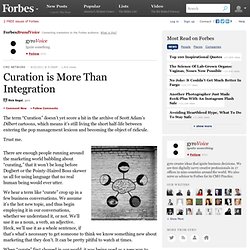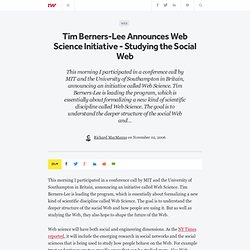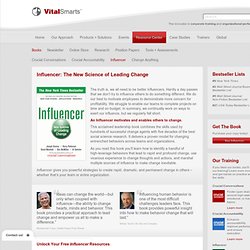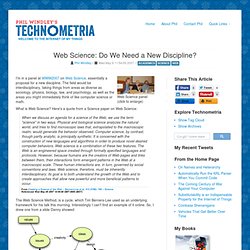

The Seven Needs of Real-Time Curators. I keep hearing people throw around the word “curation” at various conferences, most recently at SXSW.

The thing is most of the time when I dig into what they are saying they usually have no clue about what curation really is or how it could be applied to the real-time world. So, over the past few months I’ve been talking to tons of entrepreneurs about the tools that curators actually need and I’ve identified seven things. First, who does curation? Bloggers, of course, but blogging is curation for Web 1.0. Look at this post here, I can link to Tweets, and point out good ones, right? But NONE of the real time tools/systems like Google Buzz, Facebook, Twitter, YouTube, Flickr, give curators the tools that they need to do their work efficiently. As you read these things they were ordered (curated) in this order for a reason. This is a guide for how we can build “info molecules” that have a lot more value than the atomic world we live in now. A curator is an information chemist. 1. 2. Curation is More Than Integration. The term “Curation” doesn’t yet score a hit in the archive of Scott Adam’s Dilbert cartoons, which means it’s still living the short half-life between entering the pop management lexicon and becoming the object of ridicule.

Trust me. There are enough people running around the marketing world babbling about “curating,” that it won’t be long before Dogbert or the Pointy-Haired Boss skewer us all for using language that no real human being would ever utter. We hear a term like “curate” crop up in a few business conversations. We assume it’s the hot new topic, and thus begin employing it in our conversations, whether we understand it, or not. Internet Archive: Digital Library. A.nnotate.com: Upload, Annotate, Share. Online document review and collaboration - PDF, Word and HTML. ChangeAnything. 50 Sensor applications for a Smarter World. Get Inspired! Curation: The Next Big Thing? It's All Semantics: Open Data, Linked Data & The Semantic Web. Tim Berners-Lee Announces Web Science Initiative - Studying the. This morning I participated in a conference call by MIT and the University of Southampton in Britain, announcing an initiative called Web Science.

Tim Berners-Lee is leading the program, which is essentially about formalizing a new kind of scientific discipline called Web Science. The goal is to understand the deeper structure of the social Web and how people are using it. VitalSmarts - Books. The truth is, we all need to be better influencers.

Hardly a day passes that we don’t try to influence others to do something different. We do our best to motivate employees to demonstrate more concern for profitability. We struggle to enable our teams to complete projects on time and on budget. In summary, we continually work on ways to exert our influence, but we regularly fall short. An Influencer motivates and enables others to change. This acclaimed leadership book combines the skills used by hundreds of successful change agents with five decades of the best social science research. As you read this book you’ll learn how to identify a handful of high-leverage behaviors that lead to rapid and profound change, use vicarious experience to change thoughts and actions, and marshal multiple sources of influence to make change inevitable. Influencer gives you powerful strategies to create rapid, dramatic, and permanent change in others – whether that’s your team or entire organization.
Get stuff in your head and keep it there! Curation - The Third Web Frontier. Posted by Guest Writer - January 8, 2011 Here is a guest article by Partice Lamothe - CEO of Pearltrees (Pearltrees is a consulting client of SVW.) This is a lightly edited version of "La troisième frontière du Web" that appeared in the magazine OWNI - Digital Journalism - March 2010. The article argues that the founding pricinciples of the Internet are only now being implemented and that the next frontier is in organizing, or curating, the Internet.
By Patrice Lamothe Everyone realizes that the web is entering a new phase in its development. One indication of this transition is the proliferation of attempts to explain the changes that are occurring. Although these explanations are both pertinent and intriguing, none of them offers an analytical matrix for assessing the developments that are now underway. The "real time web," for example, is one of the clearest and most influential trends right now. In contrast, other explanations are far too broad to serve any useful purpose.
What is curation? Web Science: Do We Need a New Disc. I'm in a panel at WWW2007 on Web Science, essentially a proposal for a new discipline.

The field would be interdisciplinary, taking things from areas as diverse as sociology, physics, biology, law, and psychology, as well as the areas you might immediately think of like computer science or math. What is Web Science? Here's a quote from a Science paper on Web Science: When we discuss an agenda for a science of the Web, we use the term "science" in two ways. Physical and biological science analyzes the natural world, and tries to find microscopic laws that, extrapolated to the macroscopic realm, would generate the behavior observed.